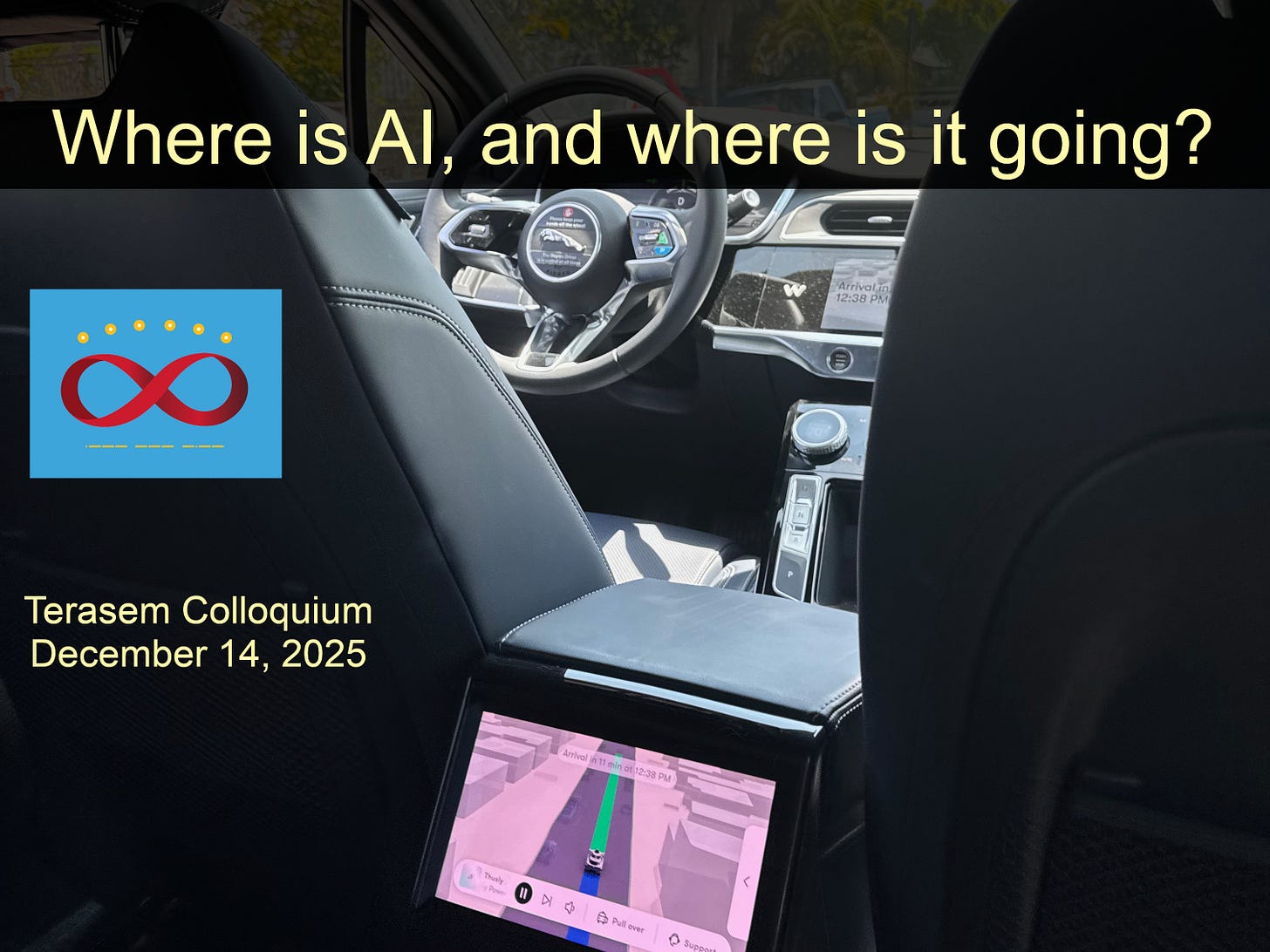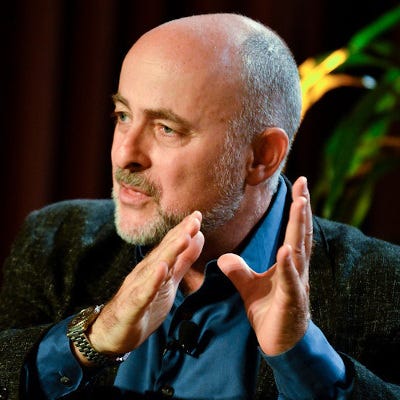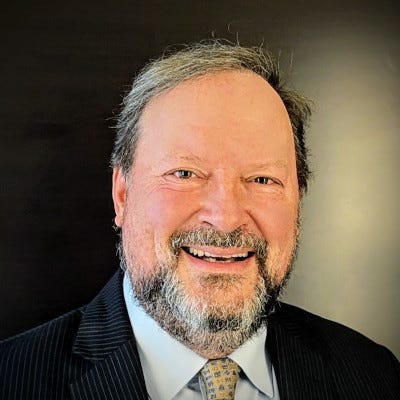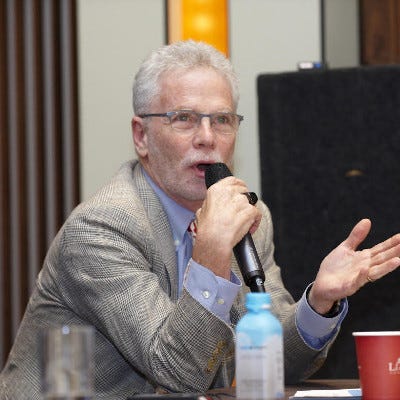Terasem Colloquium, December 14, 2025
Where is AI, and where is it going?
The Terasem Colloquium on December 14, 2025, 10am to 1pm ET via Zoom, will explore recent developments in Artificial Intelligence (AI) and future prospects. The question is: Where is AI, and where is it going?
December 14 is the anniversary of the last day with astronauts on the Moon. Apollo 17 astronauts Gene Cernan and Harrison Schmitt launched back to Earth from the Moon on December 14, 1972.
The Terasem Colloquium on December 14 will follow the previous one on July 20, dedicated to space expansion in the age of AI, and in particular to the question: Should we still want to send human astronauts to colonize space? Or should we want to leave space expansion to AI?
Videos of previous Terasem Colloquia and commentaries.
You are invited! Mark your calendar and stay tuned.
Zoom access coordinates:
Terasem Colloquium, December 14, 2025, 10am ET - 1pm ET
(7am - 10am PT, 4pm - 7pm CET).
Meeting ID: 886 6232 6473
Passcode: 832886
CLICK HERE to access the Zoom meeting.
Agenda:
10am ET - 10:30am ET: David Orban
10:30am ET - 11am ET: David Pearce
11am ET - 11:30am ET: Natasha Vita-More
11:30 ET - noon ET: David Brin
noon ET - 1pm ET: Gregory Stock
Speakers:
David Brin
David Brin is a scientist, tech speaker/consultant, and author. His novels about our survival and opportunities in the near future include “Earth” and “Existence.” A film by Kevin Costner was based on “The Postman.” His 16 novels, including NY Times Bestsellers and Hugo Award winners, have been translated into more than twenty languages. “Earth” foreshadowed global warming, cyberwarfare and the world wide web.
Speaking and advising about how science, technology and evolving values will affect our onrushing future, David has keynoted for IBM, Google, Procter & Gamble, SAP, Microsoft, Qualcomm, Price-Waterhouse, the Mauldin Group and Casey Research, all the way to think-tanks, Homeland Security and the CIA.
A Caltech Distinguished alumnus, Brin spent a decade advising NASA’s Innovative & Advanced Concepts program (NIAC). He appears frequently on shows such as Nova and The Universe and Life After People. His first non-fiction book - “The Transparent Society” - won the Freedom of Speech Award. His second nonfiction book is “Vivid Tomorrows: Science Fiction and Hollywood.” His next nonfiction work will be about under-realized aspects of the rush to Artificial Intelligence (AI.)
David Orban
David Orban is an investor, entrepreneur, author, and keynote speaker whose work explores the intersection of technology and society. He focuses on the co-evolution of artificial intelligence, decentralized systems, and exponential change. Through his writing, public speaking, media platforms (The Context, Searching For The Question Live), and ventures (including Network Society Research and Actioneer), David channels his background in physics, startups, and strategic innovation to help organizations and individuals navigate emergent futures.
His latest publications are “The AI Paradox Report” and “The Paradigm of Jolting Technologies,” frameworks that help leaders and organizations understand and act on the discontinuities of accelerating change.
David Pearce
David Pearce is author of “The Hedonistic Imperative” (1995). He advocates the use of genome reform to abolish suffering throughout the living world in favour of life based entirely on gradients of intelligent bliss. In 1998, he co-founded the World Transhumanist Association (H+) with Nick Bostrom. Transhumanists aspire to create a “triple S” civilisation of superintelligence, superlongevity and superhappiness.
Gregory Stock
Gregory Stock is a leading authority on the broad impacts of advanced technology in the life sciences. He is an adjunct professor at the Mount Sinai School of Medicine in New York. He founded and directed the Program on Medicine, Technology and Society at UCLA’s School of Medicine. He co-founded Signum Biosciences and sits on the board of its spinout, Signum Nutralogix. He is the CEO of Socratic Sciences, which leverages the power of questioning to help people better understand themselves, others, and society, while deepening relationships and reducing social isolation.
Among Stock’s books: “Redesigning Humans: Our Inevitable Genetic Future,” “Engineering the Human Germline,” “Metaman: The Merging of Humans and Machines into a Global Superorganism,” and his 2025 exploration of the human implications of artificial intelligence: “Generation AI.”
Stock has been profiled in The Wall Street Journal, The New York Times, MIT Tech Review, The New England Journal of Medicine, and Lancet; has made more than 1,500 radio and television appearances including PBS, NPR, Bloomberg, CNN, NBC, ABC, FOX, Discovery, History Channel, ARTE, France 2, Canale 5, Network Ten, TED, and the BBC; and has has been in dozens of one-on-one debates about healthcare and policy with Francis Fukuyama, Leon Kass, Ray Kurzweil, Michael Sandel, and other prominent figures.
Natasha Vita-More
Natasha Vita-More is an award-winning innovator recognized for her discovery in neuronal memory preservation, innovating the first AI-nanorobotic body prototype, and co-pioneering of a philosophical framework for human futures. She is faculty at Geneva College in Longevity Science, a Distinguished Senior Fellow at Florida Atlantic University’s Center for Future Mind, and Cultural Ambassador for ALSAE. Her work has been featured in The New York Times, Vogue, Politico, Forbes, and Wired, and honored by the Moscow and Telluride Film Festivals, the London Museum, Vigeland Museet, the Louvre Museum, and the Brooks Memorial Museum.








I agree with your premise and am super looking forward to this colloquium
what a lineup
looking forward to it